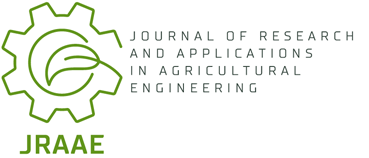Current issue
Online First
Archive
Instructions for Authors
Guide for Authors
Peer Review Policy
Research Ethics Policy
Ghostwriting and Guest Authorship
Copyright
Open Access Policy
Plagiarism
About the Journal
Aim and Scope
Scientific Board
Publisher
Editorial Board
Indexing in Databases
Personal Data Protection
Repository Policy
Contact
ORIGINAL PAPER
The study of rapeseed oil production technology of reduced macronutrients content as an engine fuel
1
Institute of Technology and Life Sciences in Falenty, Branch in Warsaw ul. Rakowiecka 32, 02-532 Warsaw
2
Institute of Technology and Life Sciences in Falenty, Branch in Poznań ul. Biskupińska 67, 60-463 Poznań
Journal of Research and Applications in Agricultural Engineering 2013;58(1):143-146
KEYWORDS
ABSTRACT
The evaluation of rapeseed oil production technology of reduced macronutrients content was executed on the specially made experimental production line. The scope of the study included the process of rape seed pressing and oil refining. Performance screw press FARMET DUO, level of oil yield and the impact of montmorillonite-based products to reduce phosphorus magnesium and calcium in raw rapeseed oil was evaluated. With the press capacity of about 10 kg of oil per hour, the oil yield was about 30%. The technology has allowed the reduction of phosphorus, magnesium and calcium to trace amounts <0.5 ppm. Based on the results, the compatibility of oil quality with the applicable quality standard of vegetable oil used as fuel for diesel engines DIN V 51 605 was proven.
REFERENCES (14)
1.
United Nations Economic and Social Commission for Asia and the Pacific. Report 2011 – www.unescap.org.
2.
Pasyniuk P. 2009. Vegetable oil as an alternative engine fuel in sustainably agriculture – economic aspect. Agricultural Engineering Problems 1/2009 p. 94-98.
3.
Budzyński W., Bartkowiak-Broba I., Heimann S., Broniarg J., Karbas M., Mrówczyński M., Adamiak E. 2009. Raw Material Production Technology. Polish Association of Oil Manufacturers, Warsaw 2009, p. 118.
4.
Grzybek A. 2004. Transesterification technologies of rape oil. In: Bio-fuels, glycerines, rape Leeds Pr. Zbior. Red. W. Podkówka. Bydgoszcz. University of Technology and Life Sciences publication p. 70-83.
5.
Szlachta Z. 2002. Supply of Diesel engined with rape fuels. Communication Publishing House SGGW, Warsaw 2002 p. 181.
6.
Bocheński C. I. 2003. Biodiesel – Agricultural Fuel. Publishing House SGGW, Warsaw 2003 p. 183.
7.
Waruszewski P., 2008. Alternative fuel in the Polish Army. Logistic Review 2008/01, p. 40-43.
8.
Hemmerlein N., Korte V., Richter H., Schroeder G. 1991. Performance, exhaust emissions and durability of modern diesel engines running on rapeseed oil. SAE Technical Papers Series 910848, 1991.
9.
Rathbauer J., Krammer K., Kriechbaum T., Prankl H., Breinesberger J. 2006. Rapsöl als Treibstoffalternative für die Landwirtschaft BMLFUW-LE.1.3.2/0037-II/1/2006. Forschungsprojekt Nr. 1337.
11.
DIN V 51605 – Fuels for vegetable oil compatible combustion engines – Fuel from rapeseed oil – Requirements and test methods Opubl. 06.2006 DIN Deutsches Institut für Normung.
12.
Golimowski W. 2011. Installation for production of rape oil as a vegetable fuel for small and average farmsteads. Problems of animal production intensification considering the territorial structure of farmsteads, environment protection and EU standards. Falenty – Warsaw 2011, p. 49-51.
13.
Cvengroš J., Pavlovicowa A., Gladisova G., Cerny J. 1999. Rapeseed oil methyl esters with phosphorus content. Fett/Lipid 101/1999, p. 261.
14.
Podkówka Z. 2004. Utilization of rapeseed and by-products of oil removal and esterification of rape oil for feed purposes. Common Work. Edition W. Podkówka. Bydgoszcz, University of Technology and Life Sciences publication, p. 166-188.
We process personal data collected when visiting the website. The function of obtaining information about users and their behavior is carried out by voluntarily entered information in forms and saving cookies in end devices. Data, including cookies, are used to provide services, improve the user experience and to analyze the traffic in accordance with the Privacy policy. Data are also collected and processed by Google Analytics tool (more).
You can change cookies settings in your browser. Restricted use of cookies in the browser configuration may affect some functionalities of the website.
You can change cookies settings in your browser. Restricted use of cookies in the browser configuration may affect some functionalities of the website.


